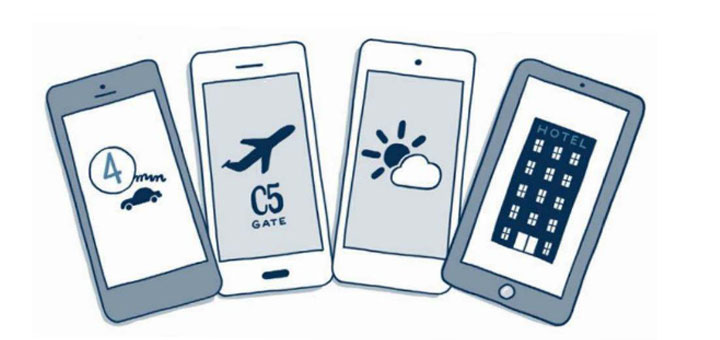Some people wake up because of it; others latch on to it as soon as they wake. For many, it’s one of their most valuable items and they check it nearly 150 times a day. The mobile device, cell phone, or tablet is a personal extension of your customer, as well as their companion when making purchase decisions. So, why should travel companies be concerned?
Mobile devices offer customers the convenience of connecting and purchasing from businesses anywhere, instantly. Retail customers use their trusted mobile phones to search for coupons or reviews before making an in-store or online purchase. A 2014 report of e-commerce stores that use the Shopify platform, stated that 50.3% of traffic came from mobile devices (40.3% from mobile phones, 10% from tablets) and only 49.7% from computers. Today, the generational shift of using mobile devices instead of computers or television as the primary screen is apparent. Travel seekers certainly aren’t shying away from the convenience of researching destination offerings on their cell phone. More importantly, they are just as apt to complete the process by making an online purchase with their mobile device.
Online sales in Canada are forecast to reach an estimate of C$34 billion in 2018, and the growing use of smart phones and tablets by Millennials is becoming a key factor in the sales increase. This growth is also seen in the travel industry’s shift in customer demand from traditional offline services to online services, as a new generation of travelers enters the market.
Statistics Canada reports over 58% of online shopping is travel related. This trend is not only seen with Canadian customers – Think Travel with Google reports 72 million Americans in 2016 will research travel, and 32 million will book travel accommodations on their mobile phone.
In a nutshell, travelers are busier than ever before, with no time or inclination to call or sit face-to-face with a travel agent to inquire about a resort. To be clear, having a travel agent to generate sales for your business is an asset, because they have a list of clientele that matches your specific target market, price range and brand. However, you also need to accommodate potential clients who don’t use travel agents; the growing demographic that prefers the online services of Expedia, iTravel2000, or your website to book a vacation right from their mobile phone or tablet.
A busy schedule is not the only aspect that encourages customers to “shop mobile.” Social media and socially-fueled discovery are significantly impacting online mobile sales. When people browse through a social media platform such as Instagram or Facebook, they come across thousands of personalized images that match their lifestyle, likes, or ideals. This discovery often turns into a spontaneous purchase via their mobile device. Social media, being a “spontaneous purchase hub,” is a tool that all businesses should utilize, but many consider it a huge obstacle – even though it has become the #1 reference point for travelers to understand brands and their business offerings. When used efficiently, social media can be a powerful marketing tool to influence your potential clients’ buying decisions.
Internet Marketing Inc. reports that 44% of travelers are most likely to learn about a new resort brand on Twitter, and 51% of people agree that Twitter content influenced their perception of the travel brand or resort. Social media is also a great tool to gain earned media from past customers. 76% of travelers said they posted vacation photos to social network accounts, which can translate to free advertising and positive word-of-mouth for your resort or villa; even more so, if the traveler connects their post to your social media account. Why would this simple social media connect or “shout-out” matter? 52% of Facebook users said their friends’ photos, which are seen as authentic and not marketer-influenced, inspired their travel plans.
There are many ways to implement a more mobile-friendly website; a good first step is visiting Google’s webmaster mobile-friendly test page. This test will pinpoint areas on your website that need improvement, and create suggestions on how to complete the task. Mobile devices will continue to be at the center of advancement in communications and technology, and businesses must implement effective strategies to meet the demands of customers through enhanced mobile communications… or face a steady road to extinction.
Feature written by Deidra Hunter

